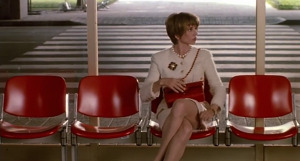(Tacones Lejanos)
Grade: C+ (**1/2 out of *****)
From “Tie Me Up! Tie Me Down!” a strange melodrama about love as amour fou, Almodovar moved to a relatively more conventional woman’s picture about intergenerational love. In “High Heels” (“Tacones Lejanos”), his follow-up to the controversial “Tie Me Up! Tie Me Down!” Almodovar changed genre and tone. Though framed as a murder mystery, this movie is essentially a melodrama about the rivalry between mother and daughter.
Once again, the movie divided critics. Some claimed that the tale is old-fashioned in its stereotypical depiction of a “neurotic career woman,” who becomes a “self-sacrificing mother”—sort of a Spanish “Mildred Pierce.” But others praised the movie for putting center-stage not one but two strong females, and again relegating the males to the periphery.
Reteaming with Victoria Avril, this time around Almodovar cast her as a TV presenter named Rebecca, a woman anxiously awaiting the arrival of her singing-star mother, Becky (Marisa Paredes), whom she has not seen since childhood. Becky is also eager to rekindle the relationship with her daughter after fifteen years of estrangement. Diagnosed with incurable heart condition, Becky’s time might be limited. Insecure and desperate to emulate her mother, Rebecca has even married one of her old lovers, Manuel (Feodor Atkine), who no longer loves her; he foolishly attempts to restart an affair with Becky. Not wasting any time, Rebecca has impromptu sex with the transvestite Letal, whose show includes an impersonation of Becky, among other acts.
 As mother and daughter begin making up for lost time, Manuel is suddenly found dead at his home. After making the quintessential Almodovarian confession, revealing that she had an affair with her son-in-law, Becky returns to Madrid. Rebecca goes public, telling the whole nation of her husband’s death. She is imprisoned, but despite incriminating evidence, the investigating judge is determined to prove her innocence. The judge arranges for Becky to see her daughter, and Rebecca denies killing Manuel, but confesses to her mother to the murder of Becky’s second husband. As a child (seen in flashbacks), Rebecca overheard her stepfather deny Becky’s wish to go to Mexico to shoot a film. To grant her mother freedom, Rebecca swapped his pills, which caused a lethal overdose.
As mother and daughter begin making up for lost time, Manuel is suddenly found dead at his home. After making the quintessential Almodovarian confession, revealing that she had an affair with her son-in-law, Becky returns to Madrid. Rebecca goes public, telling the whole nation of her husband’s death. She is imprisoned, but despite incriminating evidence, the investigating judge is determined to prove her innocence. The judge arranges for Becky to see her daughter, and Rebecca denies killing Manuel, but confesses to her mother to the murder of Becky’s second husband. As a child (seen in flashbacks), Rebecca overheard her stepfather deny Becky’s wish to go to Mexico to shoot a film. To grant her mother freedom, Rebecca swapped his pills, which caused a lethal overdose.
 Rebecca’s confession proves too much for Becky’s already weak heart, and her condition worsens. Rebecca discovers that she is pregnant with Letal’s child, and the judge releases her from prison. Rebecca goes to see Letal’s drag performance, and in the dressing room she discovers that he is actually the Judge himself; Letal is just one of his masks. Noting that dressing up is no more than investigative strategy, Letal then asks for Rebecca’s hand. While considering his offer, Rebecca watches a TV broadcast, which reports of Becky’s sudden heart attack. Rushing to the hospital, Rebecca confesses to her mother about murdering Manuel. Becky decides to take the blame so that her daughter would be free, and once the sacrifice is made, she dies.
Rebecca’s confession proves too much for Becky’s already weak heart, and her condition worsens. Rebecca discovers that she is pregnant with Letal’s child, and the judge releases her from prison. Rebecca goes to see Letal’s drag performance, and in the dressing room she discovers that he is actually the Judge himself; Letal is just one of his masks. Noting that dressing up is no more than investigative strategy, Letal then asks for Rebecca’s hand. While considering his offer, Rebecca watches a TV broadcast, which reports of Becky’s sudden heart attack. Rushing to the hospital, Rebecca confesses to her mother about murdering Manuel. Becky decides to take the blame so that her daughter would be free, and once the sacrifice is made, she dies.
 “High Heels” owes its existence to “Autumn Sonata,” Ingmar Bergman’s 1978 intense family drama about a successful concert pianist (Ingrid Bergman) who goes to visit her daughter (Liv Ullmann), whom she has not seen for many years. The mother is guilt-ridden, and the daughter is bitterly resentful of years of neglect, not to mention her burden of taking care of her chronically ill sister. It’s impossible not to read Ingrid Bergman’s movie in autobiographical terms: As is well known, in 1949, Ingrid Bergman left her husband and daughter (Pia Lindstrom) to work for Italian director Roberto Rossellini, whom she later married and had children with. Like other directors, Almodovar has professed admiration for “Autumn Sonata,” the first and only that Bergman the director and Bergman the actress made together, which sadly marks Ingrid’s last big-screen performance, for which she received the N.Y. Film Critics Circle Award and her eighth Oscar nomination.
“High Heels” owes its existence to “Autumn Sonata,” Ingmar Bergman’s 1978 intense family drama about a successful concert pianist (Ingrid Bergman) who goes to visit her daughter (Liv Ullmann), whom she has not seen for many years. The mother is guilt-ridden, and the daughter is bitterly resentful of years of neglect, not to mention her burden of taking care of her chronically ill sister. It’s impossible not to read Ingrid Bergman’s movie in autobiographical terms: As is well known, in 1949, Ingrid Bergman left her husband and daughter (Pia Lindstrom) to work for Italian director Roberto Rossellini, whom she later married and had children with. Like other directors, Almodovar has professed admiration for “Autumn Sonata,” the first and only that Bergman the director and Bergman the actress made together, which sadly marks Ingrid’s last big-screen performance, for which she received the N.Y. Film Critics Circle Award and her eighth Oscar nomination.
 “High Heels” is also inspired by Sirk’s 1959 “Imitation of Life,” his last American movie, which was his most commercially popular and also his most influential, largely due to its heightened stylization. “Imitation of Life” centers on a beautiful white actress, Lora Meredith (Lana Turner at her most glamorous), who is a neglectful mother. Lora cohabits with her self-sacrificing black housekeeper, Annie Johnson (Juanita Moore), who is the biological mother of her black girl, Sarah Jane (Susan Kohner), and the surrogate mother of Lora’s white girl, Suzie (Sandra Dee). Lora’s dilemmas are typical of the Hollywood woman’s melodrama, career versus family, professional success versus fulfilling personal life, fame versus love. As children, the two girls are treated as equals by Lora and Annie, but there are already interracial tensions, when Sarah Jane refuses to play with a black doll. As adolescents, the conflicts increase, when Sarah Jane tries to pass as white. Caught, she is brutally beaten by her white boyfriend (heartthrob Troy Donahue), and her denial and escape ultimately cause the death of her grieving mother.
“High Heels” is also inspired by Sirk’s 1959 “Imitation of Life,” his last American movie, which was his most commercially popular and also his most influential, largely due to its heightened stylization. “Imitation of Life” centers on a beautiful white actress, Lora Meredith (Lana Turner at her most glamorous), who is a neglectful mother. Lora cohabits with her self-sacrificing black housekeeper, Annie Johnson (Juanita Moore), who is the biological mother of her black girl, Sarah Jane (Susan Kohner), and the surrogate mother of Lora’s white girl, Suzie (Sandra Dee). Lora’s dilemmas are typical of the Hollywood woman’s melodrama, career versus family, professional success versus fulfilling personal life, fame versus love. As children, the two girls are treated as equals by Lora and Annie, but there are already interracial tensions, when Sarah Jane refuses to play with a black doll. As adolescents, the conflicts increase, when Sarah Jane tries to pass as white. Caught, she is brutally beaten by her white boyfriend (heartthrob Troy Donahue), and her denial and escape ultimately cause the death of her grieving mother.
The similarities and differences between Sirk’s film and Almodovar’s are telling. “High Heels,” unlike “Imitation of Life” shows no concern with social class or race. In “High Heels,” Becky escapes to Mexico to pursue her career, abandoning her daughter. Her daughter Rebecca is married to her boss at the TV station but they have no children. In “Imitation of Life,“ unbeknownst to her insensitive mother but clear to Annie, the teenager Suzie falls in love with her mother’s lover, Steve Archer (John Gavin). However, “Imitation of Life” is 1950s American melodrama, and so Suzie is attracted to Steve, but she doesn’t “dare” to sleep with him. In contrast, for Almodovar, it’s natural and no big deal that mother and daughter sleep with the same man. When Rebecca confesses to her mother that she is responsible for the deaths of her stepfather and husband, Becky just says, in a typically Almodovarian cool comedic mode, “You must find another way of settling your differences with me.” Finally, both Sirk and Almodovar are concerned with stylish elegance and the ability to deal with serious issues in seemingly crass or vulgar material, without condescending to any of the characters.
Cast
Rebecca (Victoria Abril)
Becky (Marisa Paredes)
Judge Dominguez/Letal (Miguel Bose)
Manuel (Feodor Atkine)
Alberto (Pedro Diez del Corral)
Margarita (Ana Lazaran)
Isabel (Mirian Diaz Aroca)
Judge’s mother (Mayrata O’Wisiedo)











